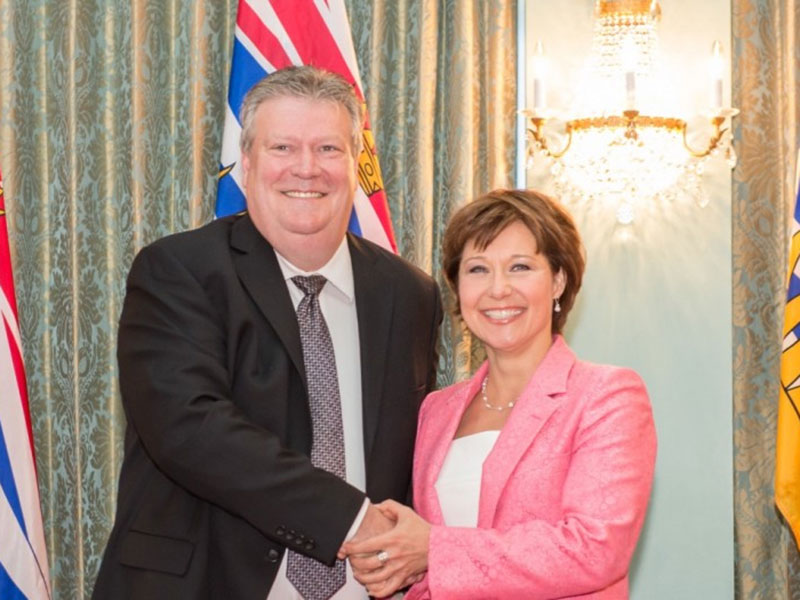Former Liberal Minister Rich Coleman has been accused of allowing gangs to launder money in legal casinos with senior police being complicit in testimony a former RCMP officer testified at a inquiry into money laundering.
A former British Columbia RCMP officer testified he was informed in 2009 that Rich Coleman, then-minister responsible for gaming, was “largely responsible” for rampant money laundering related to organized crime in the province’s casinos, and that senior B.C. Mounties were complicit, an inquiry has heard.
Fred Pinnock, former commander of B.C.’s anti-illegal gaming unit, described to the Cullen Commission on Thursday his recollection of allegations that he said then-solicitor general Kash Heed made against Coleman during a private meeting in 2009. Pinnock explained that he had tried to expand his unit’s mandate and resources to attack gangs that he believed were “out of control” in BC Lottery Corporation casinos. But his superiors in the RCMP and his partners at the Gaming Policy and Enforcement Branch didn’t support his objective, he said.
“I felt it was a charade and I don’t feel my superiors cared,” Pinnock testified. “Public safety was not a priority of my superiors with respect to gaming.” He said his frustration and friction with the gaming regulator led to his taking a medical leave in December 2007.
About a year later, he said, his former unit was disbanded by the B.C. Liberal government. And he was so disturbed by it that he tried to meet with Coleman to convey his concerns about gang activity in casinos, sending the message through his then-girlfriend, B.C. Liberal MLA Naomi Yamamoto. But according to Yamamoto, he said, Coleman reacted by rebuking her in front of the party caucus. “It was in a group setting and she described his reaction as brutal and dismissive and embarrassing,” Pinnock told the inquiry. “And my conclusion is he did not want to be told (about casino concerns.)”
Pinnock said he followed up by providing an interview to a B.C. media outlet in 2009, in which he accused the RCMP and B.C.’s government of “willful blindness” to increasing gang activity in Lottery Corp. casinos. He said Heed shot down his comments in a subsequent TV interview. However, since the two men knew each other as former police officers, they later agreed to meet in private. Pinnock recalled the meeting took place over lunch in Victoria. “I told him I am convinced that Rich Coleman knows what’s going on inside those casinos,” Pinnock recalled.
“And Kash Heed confirmed my perception that I was accurate in my belief, and he did feel that Rich Coleman had created this. “He said to me, in effect, ‘That is what is going on, Fred. But I can’t say that publicly. You know, it’s all about the money.'”
And, according to Pinnock, Heed claimed that Coleman “received the tacit support” of senior B.C. Mounties. “The context was (that) this was a game being played by senior police officers,” Pinnock said. “I think the term (Heed) used was (RCMP leaders are) ‘puppets for Coleman.'”
According to Pinnock, Heed said the RCMP leaders included Gary Bass, then-deputy commissioner for western Canada, and Dick Bent, Pinnock’s direct supervisor. But commission lawyer Patrick McGowan, as well as lawyers for the Lottery Corp. and the RCMP, confirmed with Pinnock that he did not have any notes or recordings of that meeting. Pinnock also acknowledged that he did not seek to question the RCMP officers he named, after Heed’s alleged comments.
“I’m going to suggest that all you have is a recollection of a conversation where those allegations may have been made,” an RCMP lawyer said. Pinnock agreed.Pinnock also said that he has not questioned Coleman about these allegations, and has only met with him one time since, at a B.C. Liberal fundraiser, in 2010. “We didn’t say anything,” Pinnock recalled. “I extended my hand to shake (his), and he’s a big fellow. He tried to crush my hand. I took that as a message to me.”
Coleman, who has not testified in the inquiry, has previously denied allegations that he turned a blind eye to crime in B.C. casinos. And Heed told Global News as a potential witness in the inquiry he can’t comment.
The inquiry also heard about a number of “foundational” RCMP memos that claimed Pinnock’s former anti-illegal gaming unit actually did have a mandate to tackle organized crime and money laundering in Lottery Corp. casinos. But, Pinnock said, in practice, the only message he received from the RCMP and gaming regulator was to “get along,” and that his unit was to only focus on illegal casinos in general and not on gangs in government-owned casinos.
“We were not welcome in those environments,” Pinnock said. “In practice, we were not expected to have any presence in those locations.”
The disbandment of the anti-illegal gaming unit in 2009 resulted in a gap in enforcement of money laundering until 2016, when B.C. launched an anti-gang unit to target casino crime, Pinnock testified.
The inquiry, which is mandated to determine whether corruption allowed money laundering to take root in B.C. casinos, has already heard that massive cash transactions of more than $100,000 per buy-in became common after 2010 in several Vancouver-area casinos. But Lottery Corp. staff allowed the “VIP” gamblers, who were receiving cash from a large network of loan sharks under investigation by the RCMP in 2012, to “bend” federal money-laundering rules, so as to protect the significant casino revenue they brought in, the inquiry has heard.
Some front-line Lottery Corp. investigators have also testified that their boss ordered them not to question the VIPs after one casino company complained they were intervening.
Pinnock’s testimony was scheduled to continue Friday.
https://globalnews.ca/news/7444953/rich-coleman-fred-pinnock-cullen-comm...


